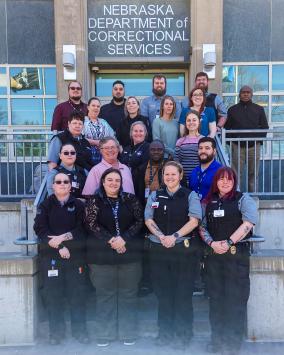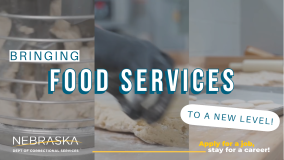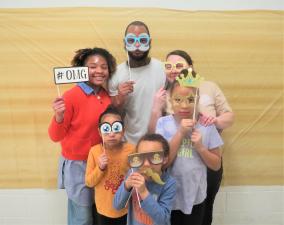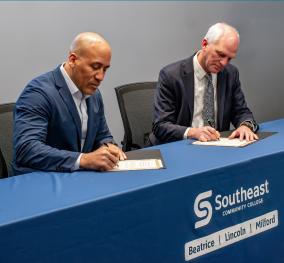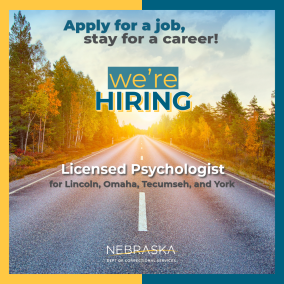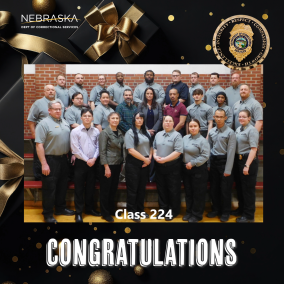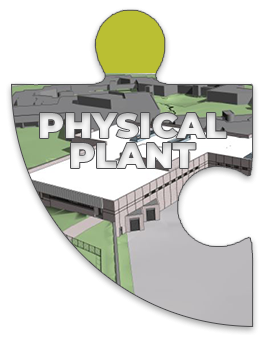|
7 Habits on the Inside |
Developed by FranklinCovey in cooperation with the Colorado Department of Corrections, 7 Habits on the Inside uses the principles of the 7 Habits of Highly Effective People, tailored for the incarcerated individual. The program seeks to empower individuals to manage their own lives in such a way as to be successful in prison and in the community and using the principles of integrity, proactivity, and other key skills. (12 weeks)
Needs Addressed: Attitudes/Behavior; Family; Employment; Life Skills
|
Non-Clinical Programs |
|
AA (Alcoholics Anonymous) |
AA (Alcoholics Anonymous) is an organization which encourages members to read, and listen at meetings using the program as an opportunity to face the truth and become accountable for their addiction to alcohol.
Need Addressed: Support for addiction and prosocial activity
|
Pro-Social Activities |
|
ACTV-NE |
A domestic violence program focused on developing new thinking in the development of relationships.
|
Non-Clinical Programs |
|
Acute/Sub-Acute Mental Health Unit (A/SAMHU) |
Highly structured treatment for individuals who are experiencing acute/debilitating distress, impairment in functioning, are actively psychotic, unable to participate in assessment, have diminished ability for self care, or who present with acute danger to self or others. .
Need addressed: Mental Health
|
Clinical Treatment |
|
Adult Basic Education |
Builds basic skills for GED testing, college readiness and/or skill development.
Need Addressed: Education
|
Education Programs |
|
Adult Secondary Education (ASE) |
Assists students prepare for taking the high school equivalency test (GED).
Addresses Need Area: Education
|
Education Programs |
|
Alpha |
Alpha promotes daily living skills and encourages character development. All classes are biblically based and open to anyone, regardless of religious affiliation. The program includes lessons on addiction prevention, understanding marriage, understanding parenthood and managing finances.
Needs Addressed: Attitudes; behavior; life skills, family
|
Vocational/Life Skills Programs |
|
Assistance for Social Security Application |
Social workers provide assistance in obtaining and completing Social Security applications to individuals who qualify and are 90 days from discharge, post-release supervision or parole.
Need addressed: Re-entry for those who may qualify for Social Security benefits due to age or disability.
|
Reentry Services |
|
Brothers in Blue |
Faith based life skills program provided in the form of a four day retreat and once a month check-ins.
|
Vocational/Life Skills Programs |
|
Cabinet Maker Apprentice |
Apprenticeship for learning carpentry skills.
Need addressed: Employment
|
Vocational/Life Skills Programs |
|
Career Readiness |
Helps individuals identify a specific career path; learn professional and personal skills to assist them in getting a job.
Need addressed: Employment
|
Vocational/Life Skills Programs |
|
Chronic Care Mental Health Unit (CCMHU) |
Designed for inmates diagnosed with a serious mental illness or significant developmental/organic disability who do not require Acute/Subacute care, and are not suited for the Mental Health Unit due to clinical or behavioral risk factors, need for assessment and/or crisis management.
Need addressed: Mental Health
|
Clinical Treatment |
|
Clinical Treatment Programs |
See clinical programs list for more details.
|
|
|
College correspondence |
Opportunity to pursue college coursework through individual and family support.
Need addressed: Education, employment.
|
Education Programs |
|
College Courses |
College courses are offered through various universities/colleges and correspondence courses. Currently, college classes are provided by grant funded providers and/or at the individual's own expense.
Needs Addressed: Education; employment; life skills; pro-social.
|
Education Programs |
|
Common Sense Parenting |
Provides parents with a menu of techniques that will aid them in building positive family relationships; preventing and correcting misbehavior; using consequences to improve behavior. Teaches self-control and how to stay calm.
Need addressed: Family
|
Non-Clinical Programs |
|
Community Coordination |
Social workers coordinate with a variety of community providers and agencies for mental health services, substance abuse treatment and medical services. Providers include the Veteran's Administration, DHHS, treatment agencies, private practice and non-profit organizations.
Needs Addressed: Housing, medical, mental health, basic needs, re-entry.
|
Social Work Services |
|
Computer based Education and Training |
Certificate program utilizing tablets for improvement in academics and job training.
Need addressed: Education. employment
|
Vocational/Life Skills Programs |
|
Computer Numerical Control (CNC) Routing Operator Apprenticeship |
Instruction and training to set up, operate, and tend a computer controlled wood routing machine.
Employment
|
Vocational/Life Skills Programs |
|
Courage to Change |
A series of cognitive-behavioral interactive journals in which participants in Longer Term Restrictive Housing can address their individual problem areas based on a criminogenic risk and needs assessment.
Attitudes/Behavior
|
Non-Clinical Programs |
|
Crisis Intervention |
Provided on an as-needed basis, clinicians are available to assist individuals in a mental health crisis.
Needs Addressed: Mental health.
|
|
|
Department of Labor Workforce Development |
Helps participants develop a resume, prepare for interviews and work on job skills.
Need area addressed: Employment
|
Vocational/Life Skills Programs |
|
Destination Dads-Inside Out Dads |
Incarcerated fathers get tools they need to become more involved, responsible, and committed in the lives of their children.
Need addressed: Family
|
Non-Clinical Programs |
|
Destination Dads-Within My Reach |
Critical and concrete tools are provided which help participants improve interactions with those who matter in their lives. Subjects are knowing yourself first, smart love and making your own decisions.
Need addressed: Family
|
Non-Clinical Programs |
|
Dialectic Behavior Therapy (DBT) |
Cognitive-Behavioral Treatment that helps participants develop mindfulness-based coping skills to decrease suicidal and self-harming behaviors.
Needs Addressed: Mental Health
|
Clinical Treatment |
|
Discharge Planning |
Reentry specialists work with individuals to ensure a reentry plan is completed. The plan allows for a smooth transition to the community and focuses on housing, transportation, employment, education, and medical/mental health services as needed.
Need addressed: Re-entry
|
Reentry Services |
|
Domesti-PUPS |
Participants in Domesti-PUPS train dogs to become service animals for persons with disabilities, pet therapy programs, classroom dogs and education programs.
Needs addressed: Pro-social, attitude, behavior
|
Non-Clinical Programs |
|
ESL/ELL |
English as a second language (ESL) provides individuals with literacy support before Adult Basic Education
Needs addressed: Education; life skills
|
Education Programs |
|
Flexibility Yoga |
High intensity, peer facilitated yoga workout intended to build strength, flexibility, and mental focus.
Need addressed: Pro-social and health
|
Pro-Social Activities |
|
Forklift Certification-CSI |
Training in how to use and operate a forklift.
Need addressed: Employment
|
Vocational/Life Skills Programs |
|
Furniture Finisher Apprenticeship |
Instruction and training in shaping, finishing, and refinishing damaged, warn or used furniture or new high grade furniture to specification.
Need Addressed: Employment
|
Vocational/Life Skills Programs |
|
Goals , Plans, and Strategies for Reentry and Life Success (GPS) |
Two learning modules to develop reentry and life skills
Addresses: life skills
|
Vocational/Life Skills Programs |
|
Harambee African Cultural Organization (HACO) |
This self-betterment club provides an opportunity to explore the root of the African American culture and heritage, including the past, present and future.
Need addressed: Outside interest, pro-social activity
|
Pro-Social Activities |
|
Health Course |
This program, delivered by a wellness expert, provides workshops on preventative health education and nutrition, such as Men's Birth Control; Date Abuse; Bullying; Gender Boxes; and Hygiene.
Need addressed: Health.
|
Vocational/Life Skills Programs |
|
High School Diploma |
NDCS operates its own school district with a high school. Students of all ages may attend high school classes. Individuals under 22 who have not graduated from high school are required to be in school. Students over 22 need to go through an application process.
Need addressed: Education.
|
Education Programs |
|
Hustle 2.0 |
A trauma informed mail based correspondence program which explores entrepreneurship, healthy relationships, leadership, criminal thinking, employment, purposeful living, reentry, anger management, character development, victim awareness, persevering, and becoming the solution.
Needs addressed: Attitudes/behavior
|
Non-Clinical Programs |
|
Individual/Group Psychotherapy |
Licensed, clinical therapists provide one-on-one or group therapy sessions as needed.
Need addressed: mental health
|
|
|
Intentional Peer Support |
This program allows individuals with similar life experiences to walk along side each other in supportive relationships.
Needs addressed: Attitudes/Behavior; Prosocial Activities
|
Pro-Social Activities |
|
KORU Mindfulness Meditation |
Focuses on self-awareness and relaxation techniques incorporating beginning yoga and deep breathing to help calm the body, mind, spirit.
Needs addressed: Attitudes/behavior.
|
Pro-Social Activities |
|
Living Needs |
Social workers assist individuals with high medical/mental health needs to find clothing resources, apply for benefits or general assistance and other life needs.
Needs addressed: Social work services.
|
Social Work Services |
|
Living Skills |
DVD series which addresses life skills that will help make the behavioral changes needed to transfer into general population.
Needs addressed: Attitudes, behavior.
|
Non-Clinical Programs |
|
MATA Club (Mexican Awareness Through Association) |
Participants in this club learn about the religious, cultural aspects, arts, customs, crafts, language, and the heritage of the Hispanic people.
Needs addressed: Outside interest and support.
|
Pro-Social Activities |
|
Materials Coordinator Apprenticeship |
Instruction and training in material handling including shipping and receiving.
Need addressed: Employment
|
Vocational/Life Skills Programs |
|
Medical Services Coordination |
Social workers assist individuals with high medical needs to set appointments for medication management, healthcare and provide resources to obtain medical insurance upon release:
Needs addressed: Health, mental health, life skills, re-entry.
|
Social Work Services |
|
Mental Health Association (MHA) HOPE supported employment |
Helps people find competitive jobs that are based on the person's preferences and abilities, developing resumes, completing job applications, preparing for interviews.
Need addressed: employment
|
Vocational/Life Skills Programs |
|
Mental Health Association (MHA) Inmate Support |
Inmate support is provided inside NDCS facilities by Mental Health Association peers trained in Intentional Peer Support.
Needs addressed: Support
|
Vocational/Life Skills Programs |
|
Mental Health Association (MHA) REAL Peer Outreach |
Provides ongoing community based support services to participants including advocating and supporting participants who want to find housing; referral and assistance obtaining other community services.
Needs addressed: support and life skills
|
Vocational/Life Skills Programs |
|
Mental Health Association Wellness and Recovery Action Plan (WRAP) |
Discusses deescalation; decision making and consequences; how trauma impacts; and how to overcome negative ways of dealing with stressful situations and crises. Need addressed: Life skills.
|
Vocational/Life Skills Programs |
|
Mental Health Outpatient Services |
Provides general, individual therapy.
Need addressed: Mental Health.
|
Clinical Treatment |
|
Metro Community College (MCC) Orientation/Initial Communication |
Teaches and discusses career planning, program determination, scholarship information, registering for classes/training, financial aid/funding information, conducting assessments, creation of educational plans, and assists students with community resources referrals.
Needs addressed: Education, employment
|
Vocational/Life Skills Programs |
|
Metro Community College (MCC)-ACT National Career Readiness |
Measures/certifies skills needed for job success. Used by employers, educators and others to provide evidence that job seekers have the skills employers are looking for.
Need addressed: Vocational Life skills
|
Vocational/Life Skills Programs |
|
Moral Reconation Therapy (MRT) |
MRT is an evidence-based, cognitive behavioral intervention which leads to enhanced moral reasoning, better decision making and more appropriate behavior.
Needs addressed: Attitudes, behavior.
|
Non-Clinical Programs |
|
My Recovery Song Journal |
A Restrictive Housing program exploring substance abuse recovery with music by expressing thoughts, feelings and ideas.
Addressed need: drug/alcohol, outside interest
|
Pro-Social Activities |
|
Native Americans Spiritual and Cultural Awareness Group (NASCA) |
NASCA is designed to help Native Americans express their uniqueness of cultural and spiritual practices. Participants are given the chance to learn how to sing, pray and dance from a Native perspective.
Needs address: Pro-social/outside interest and support.
|
Pro-Social Activities |
|
New Freedom |
Gang intervention and desistance program.
Needs addressed: Attitudes/Behavior, Aggression, friends
|
Pro-Social Activities |
|
Offset Press Operator Apprenticeship |
Training in how to operate and offset printer in the Print Shop.
Need addressed: Employment.
|
Vocational/Life Skills Programs |
|
Opening Doors CAD (Computer Aided Drafting and Blueprint) |
Teaches CAD software to increase productivity of the designer, improve the quality of design, improve communications through documentation and to create a database of manufacturing.
Need addressed: Employment
|
Vocational/Life Skills Programs |
|
Opening Doors Core Class |
The TRADE Program teaches conflict resolution; critical thinking; communication; personal finance; healthy relationships; basic computer; job preparation.
Needs Addressed: Life skills; employment.
|
Vocational/Life Skills Programs |
|
Opening Doors Seeking Safety |
Educates about consequences of trauma and the links between trauma and substance use.
__________________________________________________________________________
Addressed Need: Lifeskills
|
Vocational/Life Skills Programs |
|
Print and Bindery Apprenticeship |
Instruction and training in the binding of books and other publications, finishing products by hand or machine. Operate binding and finishing machines.
|
Vocational/Life Skills Programs |
|
Prison Fellowship Academy |
This 12-month program operates in a mission-specific housing unit and focuses on cognitive restructuring with faith-based content.
Needs addressed; Attitudes, behavior
|
Non-Clinical Programs |
|
Psychology of Incarceration |
Peer facilitated program which explores the seven criminogenic need domains as they relate to self-imposed limitations, one's thoughts, values, feelings and choices.
|
Pro-Social Activities |
|
Reading Selections and Thoughtful Responses |
Reading selections which explore topics of self-betterment and pro-social growth; accompanied by a series of thought provoking questions aimed at assisting in reading comprehension, retention and practical application of learned skills.
Needs addressed: Attitudes/behavior
|
Pro-Social Activities |
|
Reconnect KEYS (Keep Educating Yourself For Reentry Success |
The program is designed to build confidence and accountability, resiliency, problem solving skills for reentry success and personal growth.
Need area addressed: employment, reentry
|
Reentry Services |
|
Reconnect: Success Prep |
Helps participants examine behaviors and attitudes that may have contributed to their incarceration and focus on skills critical to reentry.
Needs addressed: Attitudes, behavior, life skills.
|
Vocational/Life Skills Programs |
|
Reentry planning |
Clients develop comprehensive reentry plans that include housing/transitional living, employment/education, transportation, ID credentials, medical/mental and behavioral health treatment.
Need addressed: Reentry.
|
Reentry Services |
|
Religious Classses and activities |
Variety of classes, workshops and religious services designed to help inmates with support and spiritual development.
Needs addressed: Pro-social, support.
|
Pro-Social Activities |
|
Remodeling My House |
Restrictive Housing journaling that offers a creative way to examine one's personal story. Uses the exercises to express yourself, identify challenges and opportunities, and consider change.
Need addressed: Attitudes/behavior, family, outside interest
|
Non-Clinical Programs |
|
Residential Substance Use -90 |
Residential substance use program with a focus on cognitive restructureing, relapse prevention and reentry into the community.
Need addressed: Alcohol/drug addiction.
|
Clinical Treatment |
|
Restorative Justice Intervention Program |
This program increases a participant's understanding of the harm/damages they caused their victims, communities and themselves. The program also provides an important life skill module that teaches how to become emotionally proficient, which translates into better decision making and reduced conflicts.
Needs Addressed: Attitudes; behavior, Life skills.
|
Non-Clinical Programs |
|
RISE |
This program targets entrepreneurial-minded individuals and offers intensive leadership development, business plan competitions, executive mentoring, financial investment, and startup incubation.
Needs addressed: Life skills; employment, reentry
|
Vocational/Life Skills Programs |
|
RISE Continuing Education Program |
Continuing education for all RISE graduates.
Need Addressed: Employment and Reentry
|
Vocational/Life Skills Programs |
|
Risk Assessment/ Psychological Evaluations |
Risk Assessments and Psychological Evaluations provide diagnosis clarification, intelligence testing and Dementia screening.
Need addressed: Mental Health; education.
|
|
|
Secure Mental Health Unit |
The Secure Mental Health unit is used to house inmates diagnosed with a serious mental illness or significant developmental/organic disability who are not currently suited to be housed on the Mental Health Unit (MHU) due to clinical or behavioral risk factors. Inmates are located on unit C2. Programs include METEOR, introduction to mental illness, core process groups, impulse control and management, creative expressions, meditation and stress management, in addition to others.
Need addressed: Mental Health.
|
Clinical Treatment |
|
Sex Offender Registration Act (SORA) |
Designed to increase knowledge of sex offender registration laws, how to avoid registration violations and prepare for release with registration laws in mind.
Need addressed: reentry
|
Reentry Services |
|
Skilled Nursing Facility |
On-call Skilled Nursing Facilities manage crises dealing with medical emergencies, behavioral issues and suicide watches.
Needs addressed: Health and mental health.
|
|
|
Specialized Housing Services |
Social workers provide assistance to individuals with high medical/mental health needs to obtain transitional living, assisted living or skilled nursing care, as needed.
Needs addressed: Re-entry
|
Social Work Services |
|
Specialized Population Served |
Specialized Population Served offers services for inmates with mental illness or serious chronic medical conditions that are high risk and multi-needs.
Needs addressed: Health; mental health
|
Social Work Services |
|
Sports/Recreation Activities |
A variety of activities that encourage health pastimes are offered at all facilities. Please check with recreational specialists for more information.
Needs addressed: Pro-social/outside interest; health.
|
Pro-Social Activities |
|
Standing Together on Purpose (S.T.O.P.) |
Standing Together on Purpose ( S.T.O.P.) is a multi-cultural club that teaches about the heritage and legacy of American people. S.T.O.P. aims to further promote the cultural construction of stable bridges for effective communication between all people.
Needs addressed: Pro-social; outside interest.
|
Pro-Social Activities |
|
START Now |
Mental Health programming re-enforcing personal responsibility for behavior; teaching about the connections between thoughts, feelings, and behavior; identifying strengths to build on.
Needs addressed: Mental Health, Attitudes, Behavior
|
Clinical Treatment |
|
Thinking for a Change |
Thinking for a Change is a high-level cognitive behavioral program developed by the National Institute of Corrections. The program uses role playing to concentrate on changing the criminogenic thinking of offenders.
Needs addressed: Attitudes; behavior; family; friends; aggression.
|
Non-Clinical Programs |
|
Transition Services |
Transition Services are available to those transitioning to or from general population or protective management. Mental Health professionals may assists with these services.
Need Addressed: Mental Health
|
|
|
University of Nebraska Lincoln Ethnic Studies (credit course) |
Higher level education exploring ethnic studies.
Need area addressed: Education, outside interest.
|
Education Programs |
|
University of Nebraska Lincoln Intermediate Algebra (credit course) |
Higher level education in the area of Algebra.
Needs addressed: Education, employment, outside interest.
|
Education Programs |
|
University of Nebraska-Lincoln Intro to Art (credit) |
Higher level education.
Need addressed; Education, outside interest.
|
Education Programs |
|
University of Nebraska-Lincoln Intro to Psychology |
Higher level education.
Needs addressed: Education, outside interest.
|
Education Programs |
|
Veteran's Club |
The Veteran's Group aims to assist all veterans and honorary members, including veterans of the United States of America and its Allies Forces in addition to their dependents and the widows and orphans of deceased veterans. The group provides opportunities for veterans to find employment upon release.
Need Addressed: Employment
|
Pro-Social Activities |
|
Wesleyan College Course Math (non-credit) |
College level math instruction.
Need addressed: education, outside interest, employment
|
Education Programs |
|
Wesleyan College Course Positive Psychology (no-credit) |
Provides college level instruction on psychology
Need addressed: Outside interest.
|
Education Programs |
|
Writers Block |
Offers participants therapeutic skills through writing.
Need addressed: Outside Interest
|
Pro-Social Activities |


